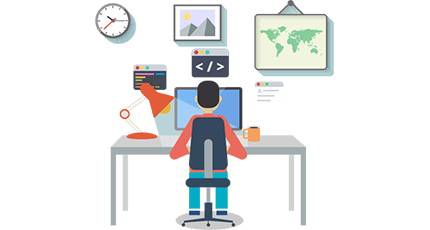
- October 27, 2023
- Innomax
- 0
Do you want to create an eCommerce website but on a budget? Hire Indian eCommerce builders. You can save more than 40% when you hire Indian eCommerce builders. In this blog post, we have shared how Indian eCommerce builders can create a low-cost website without compromising on its quality.

In this blog post, we have shared 6 ways in which eCommerce builders are able to develop low-cost online stores.
1. Choosing an Open-Source Platform
Lots of Indian eCommerce builders prefer using open-source eCommerce platforms like WooCommerce (for WordPress), Magento Open Source, or OpenCart. These platforms offer a ton of free plugins, so you can build a powerful website without stressing over hefty licensing fees. By using WooCommerce or OpenCart, your Indian builder can save you more than 40% on your online store development.
Below are five common open-source platforms that Indian eCommerce builders frequently use to create online stores.
Recommended post: Check this out before hiring a dropshipping web developer in India
# WooCommerce
Key Features:
- Integration with WordPress, a popular CMS.
- Extensive library of free and premium themes.
- Support for a wide range of payment gateways, including popular payment options.
- Robust inventory management and product listing capabilities.
- User-friendly interface for both administrators and customers.
Why Indian eCommerce Builders Choose WooCommerce:
WooCommerce, a WordPress plugin, has become a top pick for Indian eCommerce builders for creating online stores. What’s great is that it seamlessly integrates with any WordPress website, allowing webmasters to harness the full potential of this user-friendly content management system (WordPress) while effortlessly leveraging eCommerce capabilities. It’s like having the best of both worlds!
What’s more! There are dozens of great WordPress plugins that are compatible with WooCommerce stores and can add useful features to your store quickly & efficiently.
Recommended post: Why CMS & why should you hire Indian CMS developers for your website?
# Magento Open Source
Key Features:
- Scalability to accommodate large catalogs and high traffic.
- Multilingual and multi-currency support for reaching diverse audiences.
- Advanced SEO capabilities for better search engine visibility.
- A vast ecosystem of extensions and modules.
- Built-in tools for marketing, analytics, and reporting.
Why Indian eCommerce Builders Choose Magento Open Source:
Magento Open Source is a powerful and robust platform that appeals to Indian eCommerce builders looking to create feature-rich online stores. It excels in handling large inventories and high-traffic loads, making it suitable for businesses of all sizes. The platform’s flexibility, coupled with its extensive extension marketplace, allows businesses to tailor their stores to meet local market demands.
# OpenCart
Key Features:
- User-friendly admin interface for easy store management.
- Multilingual and multi-currency support for internationalization.
- A wide range of themes and extensions are available.
- SEO-friendly features for better search engine rankings.
- Integration with popular payment gateways like Paytm, Razorpay, and more.
Why Indian eCommerce Builders Choose OpenCart:
OpenCart is known for its simplicity and ease of use, making it a preferred choice among Indian eCommerce builders, especially for small and medium-sized businesses. The platform offers a balance between essential eCommerce features and affordability. With a variety of themes and extensions, businesses can quickly set up and customize their online stores to cater to local preferences.
2. Using a Free or Low-Cost Theme
Most open-source platforms offer a variety of free and reasonably priced themes. These themes provide professional designs and functionality, enabling your eCommerce builder in India to create an appealing website without the need for custom web design, which can be costly.
3. Shared Hosting Services
Indian eCommerce website builders use reliable, efficient, yet affordable shared hosting servers to host their clients’ websites. The hosting charges can affect the overall cost of eCommerce website development. It is, therefore, important to go for a low-cost yet reliable hosting package.
4. Leverage Open-Source Plugins
Similar to the themes, there is a vast library of open-source plugins and extensions available for eCommerce platforms. These plugins can add functionality to your website without the need for custom development, saving both time and money. Most Indian eCommerce builders use free plugins to reduce the cost of eCommerce website development for their clients.
5. Mobile Optimization
With a significant portion of eCommerce transactions occurring on mobile devices, it’s essential to have a mobile-responsive website. The eCommerce website builders in India choose those themes that have a responsive (mobile-friendly) design, allowing you to reach a broader audience without investing in a separate mobile app.
6. Free Services
When you hire an eCommerce builder from India, you may get a few complimentary items. Some companies or developers offer free hosting for the first year while other companies offer one month of SEO. At Innomax, we offer below complimentary services to our clients free of cost:
- Web hosting for the 1st year
- Domain name for the 1st year
- Logo design services
- 3 Months of free maintenance & support
Do you need an eCommerce website? What are you waiting for?

The right eCommerce website builder can be a catalyst for success, ensuring a robust, user-friendly platform that aligns with the unique dynamics of the Indian market. Here are 11 crucial questions to ask before entrusting the task to an eCommerce website builder in India:
What is Your Experience with eCommerce Websites?
Understanding the builder’s experience in the Indian eCommerce landscape is paramount. Inquire about their past projects, industries served, and specific challenges they’ve successfully navigated within the global market.
Can You Provide References or Case Studies from Previous Clients?
Requesting references or case studies allows you to gain insights into the builder’s track record. Hearing firsthand accounts from previous clients can provide valuable perspectives on the builder’s capabilities, communication, and overall performance.
How Will You Customize the Website to Cater to the Indian Audience?
The Indian eCommerce landscape is diverse, and customization is crucial. Ask about the builder’s approach to tailoring the website to suit the preferences, cultural nuances, and user behaviors of the Indian audience.
What eCommerce Platforms Do You Specialize In?
Different eCommerce platforms offer varied features and scalability. Inquire about the builder’s expertise in popular platforms like Magento, WooCommerce, Shopify, or others, and assess how well their specialization aligns with your business needs.
How Will You Ensure Mobile Responsiveness for a Mobile-First Market?
With a significant portion of users accessing the internet through mobile devices, mobile responsiveness is non-negotiable. Ask about the builder’s strategies for ensuring a seamless and optimized mobile experience.
What Payment Gateway Solutions Do You Integrate?
Payment gateways play a pivotal role in eCommerce success. Inquire about the builder’s experience in integrating popular Indian payment gateways, understanding their security measures, and ensuring smooth transactions for your customers.
How Will You Address Localization and Multilingual Requirements?
Ask about the your eCommerce builder’s capabilities in implementing localization features and supporting multiple languages, ensuring your website caters to a broader audience.
What SEO Strategies Will You Implement?
Search Engine Optimization (SEO) is vital for visibility. Discuss your website builder’s SEO strategies tailored for the global market, including keyword research, local SEO practices, and optimization techniques to enhance your website’s search engine ranking.
How Will You Manage Inventory and Product Catalogs?
Efficient inventory management is critical for eCommerce success. Inquire about the builder’s approach to organizing product catalogs, managing inventory, and implementing features like categorization, filters, and search functionality.
What Security Measures Will Be Implemented to Safeguard Customer Data?
Security is a top concern for eCommerce websites. Discuss the builder’s security protocols, including measures for protecting customer data, secure payment transactions, and compliance with data protection regulations.
What Are Your Maintenance and Support Services?
Post-launch support and maintenance are integral for ongoing success. Inquire about the builder’s post-launch support services, including maintenance plans, response times for issue resolution, and their commitment to ensuring the website’s continuous optimal performance.





